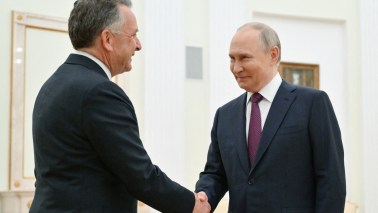George Orwell began his beautiful, nostalgic pre-war novel Coming up for Air with an epigraph from a popular song. ‘He’s dead, but he won’t lie down.’ It’s tempting to borrow the line when writing about Christianity in the West today. The chronicle of its death has been long foretold, its obituary repeatedly rewritten. Numbers, particularly in older denominations, have been heading south for decades, and churches (in Britain at least) have been shutting ever since over-enthusiastic Victorians opened far too many of them.
Yet at the same time immigration is revivifying congregations everywhere. Many people show signs of spiritual openness, few speaking well of the kind of bare-knuckle rationalism that characterised New Atheism. And a cacophony of prominent, if very different, voices – Jordan Peterson, Nick Cave, Ayaan Hirsi Ali, Russell Brand, Elon Musk, Louise Perry, Paul Kingsnorth, Tom Holland, even Richard Dawkins – have been saying positive things about the faith. Whether it is for its psychological, spiritual, social, personal, historical or just cultural contributions, a lot of sometimes unusual suspects have a good word for Christianity.
What is happening, and does any of it matter? Rupert Shortt – who as religion editor of the TLS for 20 years has written a dozen or so books on Christian thought and practice – is exceptionally well-placed to discuss this conundrum, having read, met, spoken to, or written biographies about most people working in the field. He knows an awful lot and has poured it into The Eclipse of Christianity. His erudition shines out and is the basis of the book’s many strengths, as well as its main weakness.
It has three parts.








Comments
Join the debate for just £1 a month
Be part of the conversation with other Spectator readers by getting your first three months for £3.
UNLOCK ACCESS Just £1 a monthAlready a subscriber? Log in